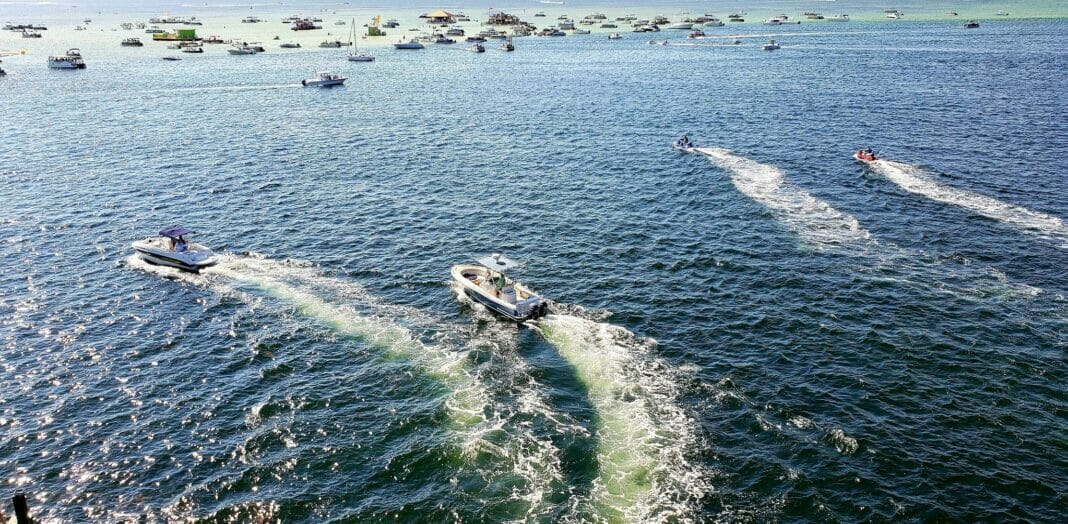Boating can be a fun and exhilarating activity, but it also comes with its fair share of risks. By avoiding these nine common boating mistakes, you can help ensure that your time on the water is safe, enjoyable, and problem-free.
Not checking the weather before heading out
One of the most dangerous yet easily avoidable boating mistakes is failing to check the weather before embarking on a trip. Being caught off-guard by sudden weather changes can result in disastrous consequences.
Before setting sail, make sure to check the local forecast and keep an eye on weather updates throughout your trip. Additionally, familiarize yourself with local weather patterns and the signs of approaching storms, such as changes in wind direction, temperature, or cloud formations.
Overloading your boat
Overloading your boat can impair your ability to steer, accelerate, and stop. In some cases, an overloaded vessel may even capsize, particularly in rough waters.
Follow the manufacturer’s recommendations for the maximum passenger and weight capacity of your boat, and distribute the load evenly to maintain its balance. Remember to account for the weight of gear and supplies in addition to passengers.
Failing to properly maintain your boat
Regular maintenance is essential to keeping your boat in good working condition and preventing accidents caused by equipment failure. Inspect your boat regularly for signs of wear and tear and perform appropriate maintenance tasks, such as cleaning, engine tune-ups, and checking for leaks and corrosion. Make sure to follow the manufacturer’s guidelines for scheduled service and maintenance on all systems.
Ignoring navigational aids
Navigational aids, such as buoys, markers, and lighthouses, are crucial to safe boating. These aids help you avoid hazardous areas, warn you of potential obstacles, and guide you safely through channels.
Familiarize yourself with the different types of navigational aids and how to interpret them. Refer to waterway charts, apps, and GPS devices to stay on course, and consider taking boating courses to improve your overall knowledge.
Operating a boat under the influence
Operating a boat while under the influence of alcohol or drugs is not only dangerous, but it is also illegal in most regions. Alcohol impairs your balance, coordination, and judgment, which can lead to catastrophic accidents on the water.
Always designate a sober skipper and discourage intoxicated passengers from engaging in risky activities, such as swimming or operating water sport equipment.
Skipping the life jackets
It may be tempting to leave life jackets stowed away if the weather is calm and the boat is cruising smoothly, but accidents can happen suddenly and without warning. Make sure that there are enough life jackets for everyone on board, and that they are the appropriate size and type for each passenger.
Encourage the use of life jackets at all times. In some areas, it is mandatory for children to wear them.
Failing to communicate your plans
Before heading out, communicate your plans to someone onshore, including your intended route, the names of passengers on board, and your estimated time of return. This will enable them to alert the authorities and initiate a search and rescue operation in case you do not return as planned.
Consider using a float plan form or smartphone app to streamline the process and ensure that all necessary information is included.
Inadequate boating education
A lack of proper boating education and experience can lead to a wide range of mistakes, from navigation errors to improper handling in emergencies. Regardless of your experience level, it is always a good idea to invest in boating education courses to refresh your skills, stay updated on regulations, and learn essential techniques for safe boating.
Many countries require boaters to have a license or complete a boating education course before operating a watercraft.
Not keeping a proper lookout
Maintaining a proper lookout is crucial for avoiding collisions and other dangerous situations while boating. Make sure that at least one person on board is always keeping an eye out for obstacles, other boats, and potential hazards.
Using your eyes, ears, and available technology, such as radar and AIS systems, can help ensure that you stay aware of your surroundings and avoid accidents.
By avoiding these common boating mistakes, you can make your time on the water as safe and enjoyable as possible. Make sure to educate yourself, follow best practices, and stay vigilant – your safety and the safety of your passengers depend on it. Happy boating!


